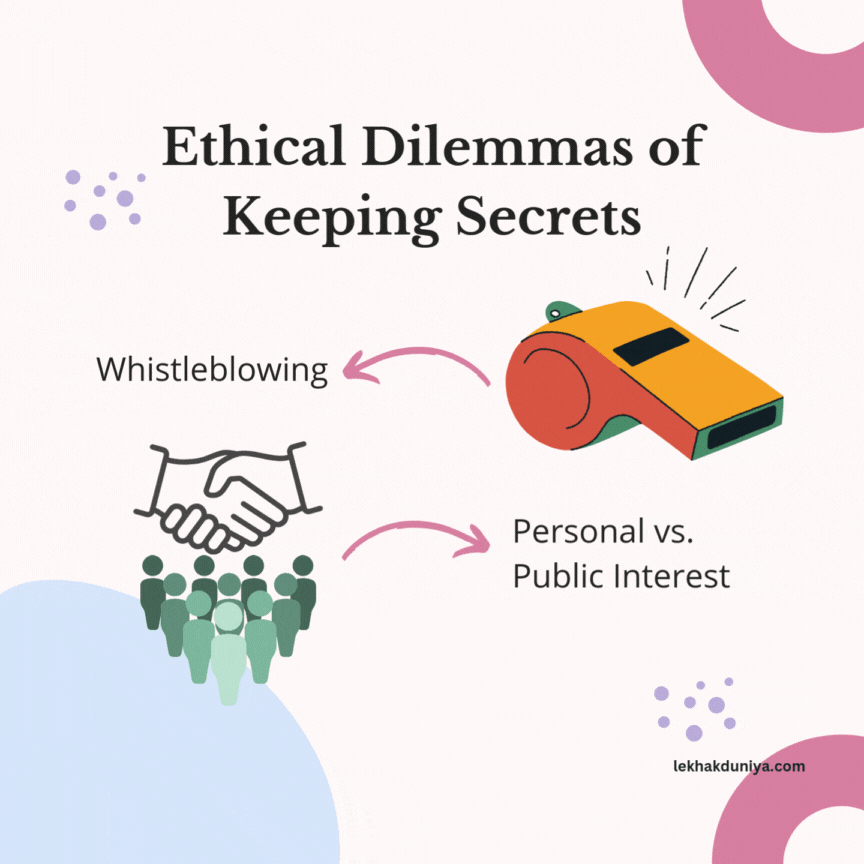Why keeping secrets matters is a topic that resonates with everyone. Whether it’s the little things we choose to keep to ourselves or bigger secrets that hold significant meaning, secrecy plays a crucial role in our personal and professional lives. At its core, a secret is a choice to withhold information from others—sometimes to protect privacy, sometimes to preserve relationships, and other times, to avoid consequences.
In this blog post, we’ll explore the reasons why keeping secrets matters, from the psychological effects to the ethical dilemmas, and how secrets impact trust and relationships. We’ll also look at the role of secrecy in professional settings and how to make smart decisions about when to keep or share secrets.
Overview of Contents
The Psychology Behind Secrecy

Understanding why keeping secrets matters starts with psychology. People keep secrets for a variety of reasons, but most often, it’s about self-preservation and control. Whether we want to protect ourselves from judgment or keep certain aspects of our lives private, secrets can be a form of emotional defense.
- Self-Preservation: One reason why keeping secrets matters is that it gives us control over our narrative. By deciding what we share and what we withhold, we maintain power over how others perceive us. This is particularly important in situations where revealing too much could make us vulnerable or put us at a disadvantage.
- Cultural Influences: Social and cultural norms also shape why keeping secrets matters. In some cultures, privacy is highly valued, and certain things—like family issues or finances—are expected to remain confidential. Here, keeping secrets isn’t just a personal choice; it’s a social expectation.
In both cases, the psychological need for secrecy stems from the desire to protect ourselves, maintain autonomy, and control how much of ourselves we reveal to the world.
The Importance of Secrets in Trust-Building

One of the key reasons why keeping secrets matters is the role secrecy plays in building trust. When someone tells you a secret, it shows they trust you and are willing to be vulnerable. Holding that secret in confidence strengthens the bond between you and deepens your relationship.
- Emotional Intimacy: Secrets create emotional intimacy because they involve vulnerability. By sharing something personal, we allow others to see a side of us that we don’t typically show. Keeping those confidences builds trust and reinforces relationships.
- Secrets as Emotional Currency: Another reason why keeping secrets matters is that they can serve as emotional currency in relationships. Keeping someone’s secret shows loyalty while revealing it can cause significant damage. This is why trust is often tied to our ability to keep secrets—especially in close relationships like friendships, family bonds, or romantic partnerships.
The Ethical Dilemmas of Keeping Secrets

A key reason why keeping secrets matters is that not all secrets are equal. Some secrets are harmless, while others can cause harm if left undisclosed. This leads to ethical dilemmas: Should you keep a secret that could hurt someone? Should you reveal a secret that’s damaging to a larger group, even if it breaks trust with an individual?
- Whistleblowing: One classic example of why keeping secrets matters in an ethical context is whistleblowing. Employees or insiders may discover unethical behavior within an organization but have to weigh the consequences of revealing that secret. In cases like these, keeping a secret might protect your job, but revealing it could serve the greater good.
- Personal vs. Public Interest: There are times when why keeping secrets matters comes down to a balance between personal loyalty and public interest. In personal relationships, revealing a secret might hurt someone you care about. However, in public or corporate settings, disclosing unethical or illegal activity may prevent greater harm.
Navigating the ethics of secrecy is complex, and this is why keeping secrets matters on a deeper, moral level. It would be best if you weighed the consequences of your choice to share or withhold information carefully.
The Psychological Impact of Keeping Secrets

One overlooked reason why keeping secrets matters is the psychological toll that long-term secrecy can have. While some secrets are easy to carry, others can become emotionally draining. Research shows that keeping significant secrets—especially those tied to guilt or shame—can lead to stress, anxiety, and even health problems.
- Mental Health: Keeping secrets for a long period can lead to feelings of isolation or anxiety, as the burden of withholding the truth grows. People who keep heavy secrets often feel disconnected from others and may struggle with feelings of guilt.
- Stress Relief Through Disclosure: While why keeping secrets matters is clear, sometimes sharing a burden with a trusted person can relieve emotional stress. By carefully choosing who to confide in, you can reduce anxiety without losing control of the information.
Professional Confidentiality and Its Importance
In professional settings, why keeping secrets matters extends beyond personal relationships to legal and ethical obligations. Confidentiality is a cornerstone of many professions, such as healthcare, law, and business. Without the assurance of privacy, patients, clients, or employees may be reluctant to share important information.
- Doctor-Patient Confidentiality: In medicine, for example, why keeping secrets matters is crucial to maintaining trust between patients and doctors. Patients must feel safe sharing sensitive information, knowing that it won’t be disclosed without their consent.
- Corporate Ethics: Similarly, in the business world, confidentiality agreements are vital to protecting intellectual property and competitive advantage. However, this is another area where why keeping secrets matters ethically, especially when illegal practices are involved. Whistleblowing scandals, like those seen in high-profile corporate fraud cases, show the consequences of breaking confidentiality for the sake of justice.
Learning to Share Secrets Wisely
Knowing when to share and when to keep a secret is a skill that develops over time. One reason why keeping secrets matters is the trust we place in others to handle that information responsibly. Sharing too much or with the wrong person can have unintended consequences, so it’s essential to be discerning.
- Evaluating Trustworthiness: Before sharing a secret, ask yourself if the person you’re confiding in has proven trustworthy. This is crucial to understanding why keeping secrets matters in your relationships. Sometimes, keeping something to yourself is the safest option.
- Setting Boundaries: Another reason why keeping secrets matters is that it allows you to set personal boundaries. You don’t have to share everything about your life with others. By holding onto certain secrets, you protect your own mental and emotional well-being.
Final Thoughts: Why Keeping Secrets Matters
In conclusion, why keeping secrets matters is rooted in the impact secrecy has on trust, relationships, and ethical responsibility. Secrets can empower us by giving us control over our personal information but they can also weigh heavily on us if they’re kept for too long or under morally complicated circumstances.

Whether in personal relationships, professional settings, or ethical dilemmas, why keeping secrets matters becomes clear when we recognize the balance between privacy and responsibility. Learning to manage secrets wisely—knowing when to keep them and when to share—is a vital part of maintaining trust, protecting relationships, and navigating the complexities of life.
FAQ Section: Why Keeping Secrets Matters
Q1. Why keeping secrets is important?
Ans: Keeping secrets is important because it helps build trust, protect personal boundaries, and maintain privacy in both personal and professional relationships. It allows people to control sensitive information and avoid unnecessary vulnerability.
Q2. What are the psychological effects of keeping a secret?
Ans: While keeping a secret can protect you emotionally, long-term secrecy can lead to stress, anxiety, guilt, and isolation. Carrying the weight of a significant secret can strain mental health, which is why sharing wisely can be beneficial.
Q3. How do secrets affect relationships?
Ans: Keeping secrets can strengthen relationships by building trust, but secrets can also harm relationships if they involve deceit or betrayal. Revealing someone’s secret without permission can damage trust and lead to relationship breakdowns.
Q4. When is it ethically right to reveal a secret?
Ans: It’s ethically right to reveal a secret when keeping it could harm others or when public interest outweighs personal loyalty. For example, whistleblowing in cases of illegal or unethical practices is often considered a moral responsibility.
Q5. Why is professional confidentiality so important?
Ans: Professional confidentiality is essential because it ensures that sensitive information is protected. In fields like healthcare, law, and business, confidentiality helps build trust and maintain ethical standards. Breaking confidentiality can have legal and reputational consequences.
Q6. How can I decide who to share a secret with?
Ans: When deciding who to share a secret with, consider the person’s trustworthiness, reliability, and discretion. Sharing with someone who has proven loyal and respectful of boundaries can reduce the risk of misusing or revealing your secret.
Q7. Can keeping a secret harm my health?
Ans: Yes, keeping significant or emotionally heavy secrets over a long period can negatively impact your health. It can increase stress, anxiety, and even physical symptoms like headaches or insomnia. Finding a safe outlet to share or process your secret can help alleviate these effects.




Pretty! This has been a really wonderful post. Many thanks for providing these details.
For the reason that the admin of this site is working, no uncertainty very quickly it will be renowned, due to its quality contents.
I believe I saw you visit my site, so I’m here to return the favor! I’m always on the lookout for ways to improve my own website, and your content has given me some great ideas.